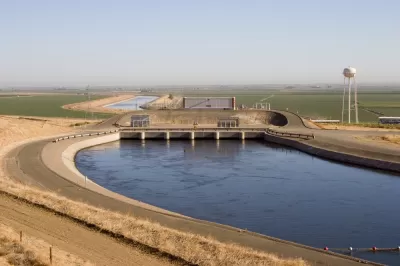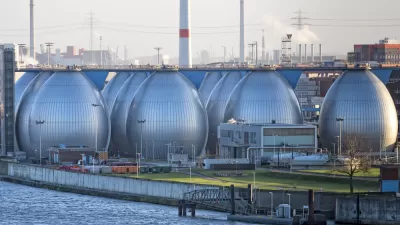California is considering piping recycled potable water directly into people's homes.

Seeking to better manage its water resources throughout the drought, California has commissioned a panel of experts to look into creating regulations for recycled drinking water, produced through a process called direct potable reuse (DPR).
News Deeply describes DPR, which other California cities have called "drought-proof," as a process in which "wastewater is treated for drinking and then piped directly to customers without first being mixed in a reservoir or groundwater aquifer." The site spoke to Jeffrey Mosher of the National Water Research Institute, who heads the panel, about the benefits and challenges of implementing DPR throughout the state. He explains:
In California the drought has put pressure on our traditional or existing supplies, whether it’s surface water or groundwater. Potable reuse, including DPR, provides a lot of advantages in the sense that it’s local – you don’t have to bring it in through a long pipeline or aqueduct.
The panel and a separate group of stakeholders will both submit reports late this month, and the State Water Resources Board will officially decide whether to develop criteria for DPR before the year's end.
FULL STORY: California Eyes Recycling Wastewater for Drinking

Planetizen Federal Action Tracker
A weekly monitor of how Trump’s orders and actions are impacting planners and planning in America.

Congressman Proposes Bill to Rename DC Metro “Trump Train”
The Make Autorail Great Again Act would withhold federal funding to the system until the Washington Metropolitan Area Transit Authority (WMATA), rebrands as the Washington Metropolitan Authority for Greater Access (WMAGA).

DARTSpace Platform Streamlines Dallas TOD Application Process
The Dallas transit agency hopes a shorter permitting timeline will boost transit-oriented development around rail stations.

Renters Now Outnumber Homeowners in Over 200 US Suburbs
High housing costs in city centers and the new-found flexibility offered by remote work are pushing more renters to suburban areas.

The Tiny, Adorable $7,000 Car Turning Japan Onto EVs
The single seat Mibot charges from a regular plug as quickly as an iPad, and is about half the price of an average EV.

Supreme Court Ruling in Pipeline Case Guts Federal Environmental Law
The decision limits the scope of a federal law that mandates extensive environmental impact reviews of energy, infrastructure, and transportation projects.
Urban Design for Planners 1: Software Tools
This six-course series explores essential urban design concepts using open source software and equips planners with the tools they need to participate fully in the urban design process.
Planning for Universal Design
Learn the tools for implementing Universal Design in planning regulations.
Municipality of Princeton
Roanoke Valley-Alleghany Regional Commission
City of Mt Shasta
City of Camden Redevelopment Agency
City of Astoria
Transportation Research & Education Center (TREC) at Portland State University
US High Speed Rail Association
City of Camden Redevelopment Agency
Municipality of Princeton (NJ)



























